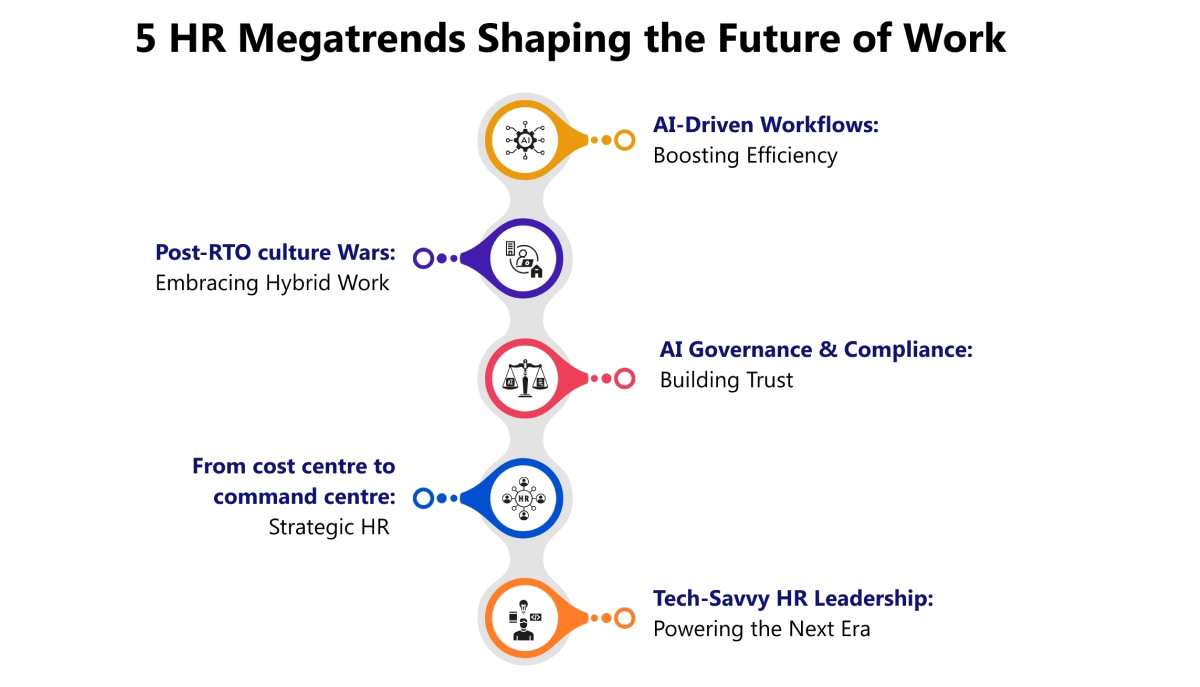
The world of work is changing faster than ever, and HR is at the heart of it. From talent management to employee experience, new trends are redefining the role of HR. Understanding these megatrends is key to shaping the future of the workforce.
This article explores five HR megatrends you can’t afford to ignore. Let’s see how these trends will help you build a stronger, future-ready workforce.
These five megatrends are setting the stage for how HR will lead and adapt, ensuring companies stay competitive and employees thrive.

One of the biggest HR trends in the coming years is the use of AI to make HR processes faster and smarter, building on the shift away from manual tasks. AI is now automating onboarding, personalizing training, and even automating interviews to save time and improve hiring.
For employees, this change is a big win. Artificial Intelligence can match candidates to jobs based on skills, not just experience, hence, opening doors for new talent.
Also, there’s one thing to note, AI learns from past data, which can carry biases, like favoring certain names or backgrounds. Studies, like those from the Joseph Rowntree Foundation, show candidates with “non-white-sounding names” often get fewer interview calls. It’s a red flag and if HR doesn’t act, this bias can grow.
To tackle this, HR strategy needs to:
In recent times, a new use of AI is gaining attention, i.e., automating interviews. AI-powered tools can conduct initial interviews, asking candidates standard questions and analyzing their responses using voice tone, facial expressions, and answers. This helps HR spot top talent quickly and reduces bias by focusing on skills and fit, not just first impressions. For example, AI can schedule interviews, score responses, and even suggest follow-up questions, making the process smoother.
It can also transform HR with tools like Predictive Workforce Planning and AI-Powered Organizational Design. Predictive Workforce Planning uses AI to forecast future staffing needs based on trends, helping HR prepare for growth or changes before they happen. For example, it can predict when more engineers will be needed or spot early signs of turnover. AI-Powered Organizational Design reshapes teams and roles using data to improve efficiency and collaboration. It suggests the best team structures or identifies where new skills are needed, making organizations more adaptable.
Note: AI can be a “DEI ally” if HR builds equity into it from the start. This HR megatrend requires HR to master AI as a tool and a strategy, ensuring it lifts up the workforce while staying fair.
The debate over returning to the office (RTO) has split employees and companies. Some want the old office days back, while others crave flexibility. The smart move for HR today is to create hybrid work setups that balance collaboration and freedom.
This HR megatrend brings challenges, especially across generations. Older employees often see desk time as loyalty, while Millennials and Gen Z value impact over hours. Add in global teams, neurodiversity, gender equity, and tension grows. Traditional ways of working, based on hierarchy and presence, clash with today’s need for innovation.
To lead this change, HR can:
This shift is about building a culture that thrives anywhere. Companies that get this right will keep their best employees and lead the future of HR.
Note: The key is designing a hybrid world where everyone feels included.
As AI grows, so do the rules around it. HR will face a new HR megatrend: managing AI with trust and compliance. AI decisions on hiring, promotions, and performance carry risks like bias, data misuse, or lack of transparency.
For HR, this means moving from a “soft” role to a strategic one. Employees and top talent want to work for companies with clear, fair AI systems. If AI unfairly screens candidates or lacks oversight, it can damage a company’s reputation and lose talent.
Note: The future of work depends on building trust through responsible AI use.
Another major HR megatrend is the shift of HR from a support role to a strategic powerhouse. HR is increasingly driving innovation, culture, retention, and organizational intelligence becoming the “business” itself.
Many old-school companies are stuck in the past with rigid hierarchies and slow decisions. They measure success with outdated metrics like headcount or turnover, missing the fast-paced changes of today. This mismatch hits younger employees hard, Gen Z and Millennials want flexibility, growth, and purpose, not just loyalty.
To evolve, HR should:
Note: This HR megatrend turns HR into a co-pilot for the future of HR, aligning people strategy with business goals. Companies that adapt will win the war for talent.
The final HR megatrend is the growing need for tech-savvy HR leaders. The job market for HR talent is heating up, with roles like Chief People Scientist or AI Ethics Officer becoming real.
Today’s HR leaders need to blend people skills with data, law, and ethics. Companies like Unilever, Microsoft, and Salesforce are leading the way. Unilever uses AI with a DEI focus, Microsoft predicts burnout with workforce intelligence, and Salesforce trains employees on ethical AI. These firms show how strategic HR builds trust and attracts talent.
To succeed, HR can:
Note: This HR megatrend demands leaders who can navigate complexity and drive the future of HR with impact.
These HR trends are about more than keeping up, they’re about leading the workforce into the future. AI, hybrid work, trust, HR strategy, and tech skills shape how employees work and feel. Companies that ignore them risk losing talent and relevance. Those that embrace them, like Unilever and Microsoft, build stronger cultures and attract the best.
As AI continues to grow, so do the rules surrounding it. In coming years, HR will face a major new trend: managing AI with a focus on trust and compliance. Decisions made by AI in areas like hiring, promotions, and performance come with risks such as bias, data misuse, or lack of transparency. a key voice warns, “Trust is the highest yield asset in the digital economy,” highlighting its critical role.
This shift pushes HR to move from a “soft” support role to a strategic leader. Employees and top talent want to join companies with clear, fair AI systems. If AI unfairly screens candidates or operates without proper oversight, it can harm a company’s reputation and drive away valuable people. The future of HR hinges on building trust through responsible AI use.
Supporting this, a 2024 Gallup/Bentley University survey found that only 23% of American consumers trust businesses to handle AI responsibly, revealing a big trust gap that HR must address to maintain a strong reputation and attract talent. Meanwhile, a 2025 IAPP AI Governance Profession Report found that about 47% of companies worldwide now see AI governance as a top priority, showing its growing importance in HR decisions like hiring and promotions.
Here’s how HR can step up:
By leading with trust, HR can turn AI into a strength for the workforce, attracting talent and avoiding legal pitfalls.
Ready to act on these HR megatrends? Here’s a simple plan:
Leadership programs can help HR leaders adapt. Focus on real-world skills, not just theory, to lead change.
These HR megatrends show that the future of HR is about people and technology working together. Whether it’s fighting bias with AI or building a hybrid culture, HR must evolve to support employees and businesses alike.
As we progress, the question is clear: Are you building for the future or stuck in the past? The choice is yours, and it starts with embracing these HR megatrends today.

CredBadge™ is a proprietary, secure, digital badging platform that provides for seamless authentication and verification of credentials across digital media worldwide.
CredBadge™ powered credentials ensure that professionals can showcase and verify their qualifications and credentials across all digital platforms, and at any time, across the planet.

Please enter the License Number/Unique Credential Code of the certificant. Results will be displayed if the person holds an active credential from TMI.